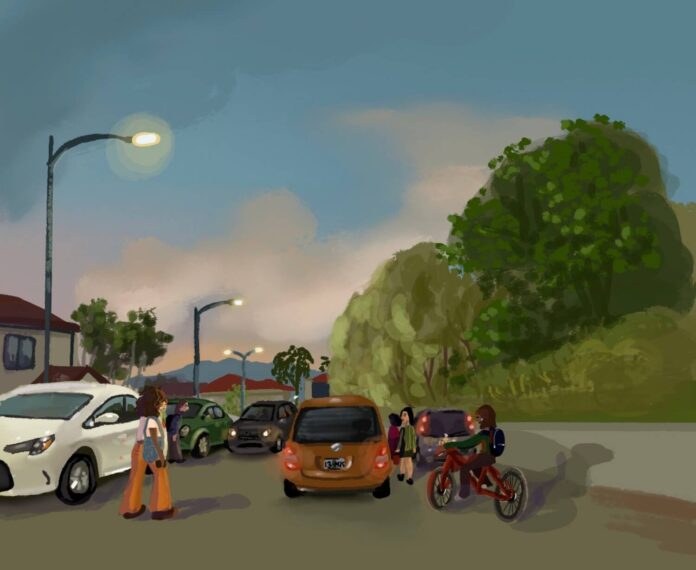On the night of Feb. 8, someone stole my bike. It was a beautiful red Trek Series One 1.1 road bike. If you were wondering, I did lock it up; someone just happened to have a tool that could cut my chain lock. I don’t say this to elicit sympathy — my family is affluent, and I’m able to afford a new bike and lock setup in the future should I need one. What I aim to bring attention to here is not the fact that my bike was stolen, but that this bike theft is representative of the broader lopsided treatment that bicyclists and pedestrians receive compared to cars.
A common response to bike thefts is that cyclists should not bring expensive bikes to campus. However, most bicycles cost between $300 and $700 — my bike was around $600, for reference — while most cars cost at least $5000. Is it really fair to tell bike owners that they should not spend a little extra money on a higher quality bike that will last a long time, especially since an “expensive bike” is still far less expensive than even a low-end car? Of course cars and bikes are not completely apt comparisons, but they are very similar — both are essential modes of transportation that students rely on. The difference, though, is that cars get a level of support from Occidental that they really shouldn’t.
The college gives an almost comical level of subsidy to cars and the students that own them. The primary method is through free parking for all students. As Donald Shoup writes in his book “The High Cost of Free Parking,” free parking is expensive on a societal level, yet 99 percent of the time, drivers do not directly pay for these expenses. A parking spot in a garage costs around $20,000 to build, with spots in some garages costing as much as $50,000 a spot. Of course, the college does not eat this cost when it gives student parking permits for free — it gets passed onto all of us in the form of higher student fees. This essentially represents a transfer of money from students who made the environmentally responsible decision to use a bicycle or take public transit to those who store their cars on campus. This is especially aggravating since the average car spends 95 percent of its time parked.
Of course, the college does in fact give some support to bicyclists and public transportation users by providing bike racks and transit passes. Bike Share is also a great resource for bicyclists, but these subsidies are minuscule in comparison to the college’s subsidy of cars. Can the college really care about climate change and its sustainability when it dedicates an absurd amount of space to cars? Is it fair to give free gated storage to cars, while forcing students who depend on bicycles to settle for locking up on low-quality tube metal bike racks right on the street — free for any thief to steal? That is inequitable and does not promote the sort of sustainable transportation operations the college claims to support.
If the college truly does care about the climate, then it’ll stop forcing students without cars to settle for less. It will do so by removing the space that it dedicates to cars and making car owners pay for all their costs instead of foisting those costs onto the rest of us.
Every carrot is paired with a stick: we should not expect any kind of investment in green technology to pay off without a carbon price that forces investors away from fossil fuels, and we do not expect public services to be paid for without taxes. When it comes to car ownership, though, the answer has always been to give people without cars the bare minimum support and never to give people the car-free places we deserve.
The goals of making life easy for drivers and bearable for cyclists and pedestrians are diametrically opposed. The college’s current priorities lie with the former, but if they care about sustainability, they will encourage the latter by:
- Providing secure bike lockers at dorms to give bicycle owners the peace of mind that car owners get.
- Charging for parking permits at market rate. Underpriced permits force students without cars to pay for others to park.
- Removing and repurposing excess parking lots and structures for public spaces or student housing.
- Banning cars from most of the campus, especially near every dorm. There are copious non-personal car modes of transport available in our area — from LINK scooters to Metro Micro to Zipcar — meaning there is very little if any need for students to store their personal cars on campus.
These reforms may seem excessive or unachievable, but I hope that I have shown that they are necessary. The quality of life for those without cars has been neglected by the college for far too long — we walk on wide roads without sidewalks that cars speed down on, we have our bikes stolen all the time and we are tired. We deserve better.
![]()































